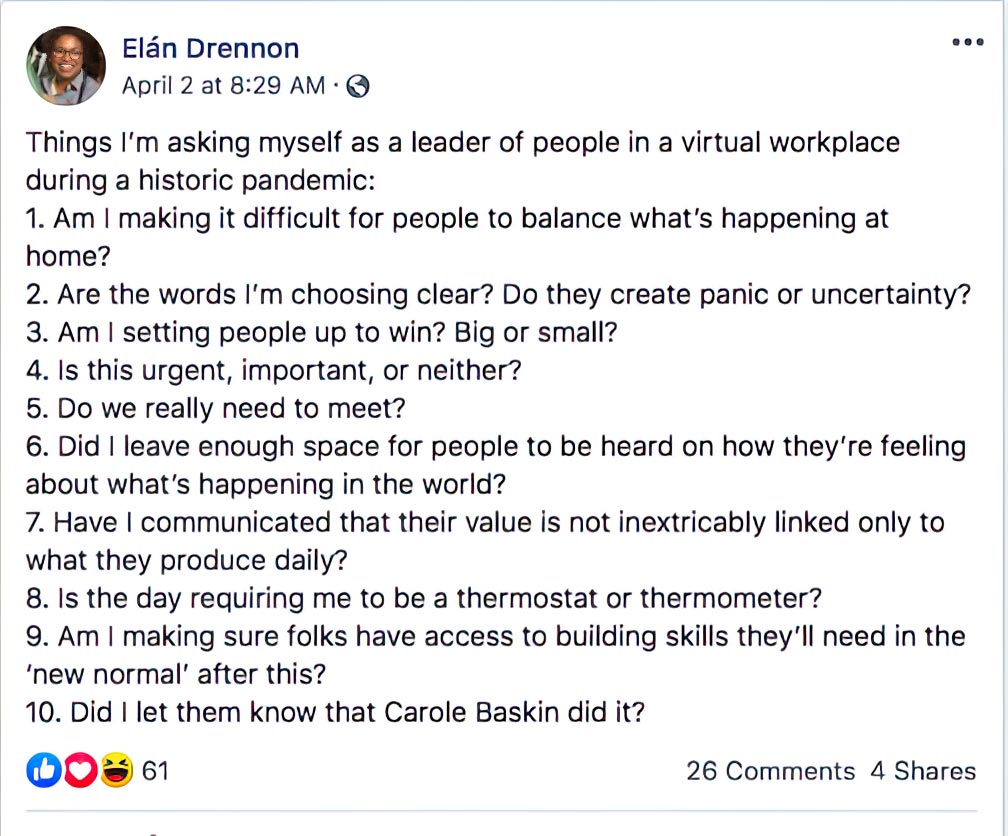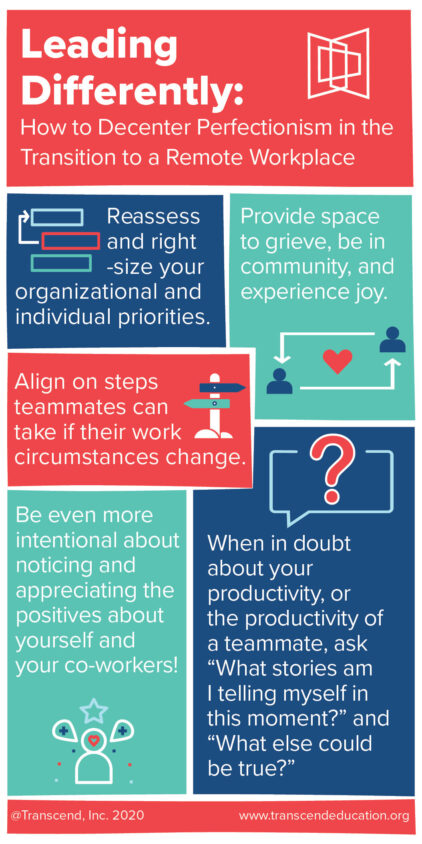Leading Differently: How to Decenter Perfectionism in Remote Working and Learning


As more and more organizations become virtual (in some cases, doing so overnight), more of us are contending with how to build strong, trusting, remote cultures. Whether we work at a school, intermediary non-profit, or another type of organization, we are grappling with many logistical and personal challenges that come with a transition to remote work. In the midst of this rapid and (in many cases, imposed) transition, it can be very tempting to fall into perfectionism as a way to maintain a sense of control in an otherwise uncontrollable situation.
But it’s important to remember that perfectionism does not equal excellence. Often when exploring the principles in White Supremacy Culture, folks will push back by exerting the importance of reaching for excellence. But, perfectionism is not about excellence.
Perfectionism is about a deep-seated need to do whatever it takes to be accepted and well-regarded, and often goes hand-in-hand with shame.
Perfectionism is about a deep-seated need to do whatever it takes to be accepted and well-regarded, and often goes hand-in-hand with shame. Moments when we or others do not live up to our image of perfection can trigger fear of losing others’ respect and / or self-deprecating thoughts (e.g., I’m not good enough, why couldn’t I…). As Brene Brown has said, “When perfectionism is driving, shame is always riding shotgun—and fear is the annoying backseat driver.”
And during a time of crisis, perfectionism can be especially damaging to individuals and organizations.
We could likely talk about this all day and truly get into many of the nuances between perfectionism and excellence; but, in the spirit of recognizing the here and now, we’ve gathered some of our lessons learned about decentering perfectionism (and centering your values while maintaining a commitment to high quality work) from across our remote organizations:
1. Reassess and Right-Size Your Organizational and Individual Priorities (Including Your Staff’s or Students’ Workload).
Go back to your organization’s mission or your portrait of a graduate and ask what is most essential right now. The temptation will be to fill every moment of the day with learning or work, to make every project into a virtual workstream. In some cases, that would be the right step for your organization. In many cases, it’ll be important to decrease the number of high-priority focus areas at this moment. Check in with your team and get a sense of their current capacity (including their mental health)—how are they emotionally managing the change? Do they have a community of support at home or are they managing children (or other responsibilities) alone? Right-sizing your priorities will support your team in avoiding the temptation to get everything done, regardless of the cost.
2. BE intentional about providing space to grieve, to be in community, and to experience joy.
In addition to individual check-ins, make some space as a community to clearly name the changes, acknowledge the emotional impact, and provide ongoing resources to manage a range of emotions. This pandemic is also giving us an opportunity to be with each other in ways we may not have been together in a long while. Take advantage of that when possible—provide some fun communal spaces (e.g., concerts, dance parties).

3. Align on steps teammates can take when/ if their circumstances change.
There are a number of uncertainties within families, homes, and organizations at this time. So things may change quickly. Develop a plan about how you’ll manage changes (e.g., a teammate gets sick, a teammate now needs to manage children or other family members solo and cannot work the same number of hours as before, students stop logging in after a few weeks) and communicate and refine that plan with your team. Setting and continually reaffirming that you’re being flexible during these times will help your teammates resist any shame or fear that may come from not being able to do as much as they were doing before.

4. Be mindful of the stories you’re constructing.
After the first three steps, ask “what stories am I telling myself in this moment” and “what else could be true” when doubts about another teammate’s productivity / dependability come to mind. In virtual organizations, it can be especially tempting to appear online all day or to produce, produce, produce (see quantity over quality). When one or both of those is not happening, it can be tempting to assume that a teammate is not working. Before sharing that assumption with your teammate or teammates, pause and consider what else might be prompting them to not be online etc and check in with them on how they’re managing the transition, considering 1-3 above.
5. Be even more intentional about noticing the positive
Notice the positives about yourself, your kids, and your co-workers and appreciate the people around you!
Lavada Berger is a Partner at Transcend, leading relationship-centered diversity, equity, and inclusion work. Transcend is a member of the Remote DEI Collective, which is a community of practitioners in the K-12 education space aiming to advance DEI specifically within remote environments.
Transcend supports communities to create and spread extraordinary, equitable learning environments.

